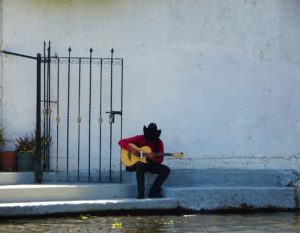Image by Stevan Aksentijevic from Pixabay.
In this blog post we’ll look at vocabulary and expressions that you can use to describe people in Italian.
Questo è il mio amico. This is my friend.
Let’s start with phrases you can use to introduce people and say how you know each other.
- Questo è il mio amico / Questa è la mia amica.
This is my friend. - Lavoriamo insieme.
We work together. - Lavoravamo insieme.
We used to work together. - Andiamo a scuola insieme.
We go to school together.
- Andavamo a scuola insieme.
We went to school together. - Dove vi siete incontrati? / incontrate?
Where did you meet each other? - Ci siamo incontrati / incontrate all’università / a una festa / a un pub / a un bar.
We met at university/at a party/at a bar/at a coffee shop. - Abbiamo amici in comune.
We have mutual friends. - Ci conosciamo da anni.
We’ve known each other for years. - Siamo cresciuti / cresciute insieme.
We grew up together. - Siamo vicini / vicine di casa.
We’re neighbors.
È alto. He’s tall.
If you’re telling someone about a friend, you may want to describe him or her. Let’s start with physical characteristics.
- Com’è?
What does he/she look like? - È alto / alta.
He’s/She’s tall. - È basso / bassa.
He’s/She’s short. - È bello / bella.
He’s/She’s good looking. - È magro / magra.
He’s/She’s thin. - È grasso / grassa.
He’s/She’s fat. - È giovane.
He’s/She’s young. - È anziano / anziana.
He’s/She’s old. - È in forma.
He’s/She’s in shape. - È fuori forma.
He’s/She’s out of shape.
Ha i capelli lunghi. She has long hair.
People have all sorts of different acconciature hairstyles, so that’s a common way to describe people.
- Ha i capelli corti.
He/She has short hair. - Ha i capelli lunghi.
He/She has long hair. - Ha i capelli lisci.
He/She has straight hair. - Ha i capelli ricci.
He/She has curly hair. - Ha i capelli biondi / neri.
He/She has blond hair/black hair. - Ha i capelli rossi / castani / bianchi.
He/She has red hair/brown hair/gray hair. - Ha le trecce.
She has braids. - È calvo.
He’s bald. - Ha i baffi / la barba.
He has a mustache/beard.
Personalità Personalities
Sometimes we describe people we know by talking about their personality types.
- Com’è di carattere?
What kind of personality does he/she have? - È timido / timida.
He’s/She’s shy. - È socievole.
He’s/She’s outgoing. - È serio / seria.
He’s/She’s serious. - È ansioso / ansiosa.
He’s/She’s anxious. - È alla mano.
He’s/She’s easy-going. - È una persona allegra.
He’s/She’s a happy person. - È una persona infelice.
He’s/She’s an unhappy person. - È molto organizzato / organizzata.
He’s/She’s very organized. - È ottimista.
He’s/She’s an optimist. - È pessimista.
He’s/She’s a pessimist.
Mi piace! I like her!
If you like someone, caratteristiche positive della personalità positive personality traits are probably something you would use to describe them.
- Ha un bel carattere.
He/She has a great personality. - Mi piace un sacco.
I like her/him a lot. - È un buon amico / una buona amica.
He/She is a good friend. - È molto interessante.
He’s/She’s very interesting. - È molto solare.
He’s/She’s very cheerful. - È sempre di buon umore.
He’s/She’s always in a good mood. - È molto amichevole / gentile.
He’s/She’s very friendly/nice. - È un amico leale / un’amica leale.
He’s/She’s a loyal friend. - È premuroso / premurosa.
She’s thoughtful of others. - È di mentalità aperta.
He’s/She’s open-minded. - È modesto / modesta.
He’s/She’s modest. - Va d’accordo con tutti.
He/She gets along with everyone.
Non mi piace! I don’t like him!
On the other hand, if you don’t like someone, caratteristiche negative della personalità negative personality traits are what you’d use to describe them.
- Non mi piace.
I don’t like him. I don’t like her. - Mi fa innervosire.
He/She gets on my nerves. - È sempre di cattivo umore.
He’s/She’s always in a bad mood. - È scortese.
He’s/She’s mean/unfriendly. - È ostinato / ostinata.
He’s/She’s stubborn. - È di mentalità chiusa.
He’s/She’s closed-minded. - È noioso / noiosa.
He’s/She’s dull/boring. - È egoista.
He’s/She’s selfish. - È arrogante.
He’s/She’s arrogant. - Non è affidabile.
He’s/She’s not trustworthy. - È sconsiderato / sconsiderata.
He’s inconsiderate. - È un cretino / una cretina!
He’s/She’s a jerk!
È sempre sorridente. He always smiles.
We often describe people by talking about their abitudini habits.
- Sorride sempre. Non sorride mai.
She smiles all the time. She never smiles. - Ride sempre. Non ride mai.
He laughs all the time. He never laughs. - Lavora duro.
She works very hard. - È pigro.
He’s lazy. - Si lamenta continuamente.
She complains a lot. - Non si lamenta mai.
She never complains. - Non vuole mai fare niente di divertente.
He never wants to do anything fun. - Vuole sempre fare qualcosa di emozionante.
She always wants to do something exciting. - Si allena molto.
She works out a lot. - Gioca troppo ai videogiochi.
He plays too many video games. - Segue sempre le regole.
He always follows the rules. - Fa tutto quello che vuole.
She does whatever she wants. - Esce spesso con gli amici.
She goes out with her friends a lot. - Gli piace stare a casa.
He likes to stay home. - Pratica molti sport.
She plays a lot of sports. - Legge tutto il tempo.
He reads all the time. - Organizza delle belle feste.
He throws great parties. - Fa tantissimo per i suoi amici.
She does a lot for her friends.
È davvero intelligente. She’s really smart.
People have different abilità talents and interessi interests, and sometimes we describe people by saying what they’re good (or not so good!) at.
- È intelligente.
He’s/She’s smart/intelligent. - Si interessa di storia / lingue / arte / cinema.
He’s/She’s interested in history/languages/art/movies. - Scrive / cucina / dipinge / canta benissimo.
He/She writes/cooks/paints/sings very well. - Ha un sacco di hobby.
He/She has a lot of hobbies. - Ama gli animali.
He/She loves animals. - Ama viaggiare.
He/She loves to travel. - Ama passare il tempo con gli amici.
He/She loves to spend time with friends. - È bravo / brava a tennis.
He’s/She’s good at tennis. - È negato / negata con il tennis.
He’s/She’s terrible at tennis. - È un / una musicista di talento.
He’s/She’s gifted musician. - Non sa cantare / ballare bene.
He/She can’t sing/dance well. - È molto creativo / creativa.
He’s/She’s very creative. - Non è molto creativo / creativa.
He’s/She’s not very creative. - Ti piacerà!
You would really like him/her!
Do you want to learn Italian?
Check out our other posts on Italian language, culture, and more. And if you’re looking for convenient and affordable live Italian lessons with a real teacher, check out The Language Garage. Our lessons are given online in a virtual classroom, so it doesn’t matter where you live or work – we can come to you. And we have flexible options, with a free trial so that you can decide if there’s a fit. Check us out!







